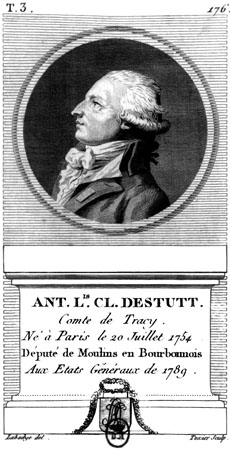The word “ideology” first appeared in French. In the 1790s, a gentleman with the wonderful name of Antoine Louis Claude Destutt, Comte de Tracy used it. Marx and Engels in 1846 wrote a manuscript called The German Ideology that never found a publisher till 1932 at the German-English Institute in Moscow.
The word itself circles around the issue of whether our minds have any contact with the world that is. Much is at stake here. If no connection exists between what is out there and our minds, then all we know or can know is our own thoughts. And since our minds have no connection with things, we can formulate whatever world that we would like to have. Everybody lives in his own separate world. Our minds have no reality check.
Revelation is often said to be an “ideology”; that is, an arbitrary system of ideas that have no relation to reality. Ideology and fantasy, however, are not necessarily the same things. Fairy tales and fantasy usually have some grounding in a reality that once was or is yet to be. Ideology is rather a set of ideas imposed on or taken to be reality whereby what is seen and done takes place exclusively within the mind.
Revelation contains an account of actual events with their ultimate explanation rooted in an existing transcendent order. Revelation can be treated as a fantasy, as Tolkien did. But it cannot be considered an ideology. For those who insist that our minds have no relation to things, however, their only option, on hearing it, is to claim that revelation must be just fantasy or another ideology.Revelation does not profess to be skeptical about the existence of an ordered world.
Why bring up any reconsideration of ideology? The world that most people now live in is an ideological world. It is a world whose limits and configuration are assembled from their desires of what they would like to be, not to what is.
A reason for this preference of ideology can be proposed. To be a consistent ideologue, we must first figure out a way to disconnect our minds from things. Much of modern thought from Descartes on has assisted us in this doubt that we can really know things that are. The trouble with existing things, including especially human things, is that, left to themselves, they are already definite kinds of things. They do not themselves configure what they are, but something did.
It is to this latter reality of what things are to which our minds are normally directed and which they know once they have encountered and identified them. Today those who hold revelation to be true are told that they must bring their “ideology” up-to-date. What is meant is that the revelation that is directed to things must be replaced by the ideology that sees no relation between things and mind.
The reason why ideology has come to be legislated into the political reality of most so-called modern democratic states is that this ideology does not conform to reality. What has been rejected is reality. What has taken its place is a construct of the mind. In former times, we spoke of people who rejected a proper way of living as “sinners.” Today, we insist that no sin exists except the claim that “reality” contains an intelligible order that is given to us for our own good, an order that we can discover with our own minds.
We are, as a consequence, forced to lie to ourselves about reality. We have to insist that abortion is not the killing of an actual human life even though every bit of evidence shows that it is. We have to insist that two members of the same sex can “marry,” which is the one thing they cannot possibly do. The list goes on. One denial of an order in things leads to another. We now find it necessary to prevent people from even talking about some radical error that we have made in our understanding of things.
The logical consequence of replacing reality with ideology is that no one has grounds left to correct us in what we do or say. When we evaporate meaning from things, we are in effect insisting that things are not “created,” that they do not find their source in a Creator who is not part of this world, a Creator who, in creating the world, did so with the Logos, the Word, in mind,
It is from the fear of finding this “word” in things that forces modern men and women to fall back on themselves, to deny that anything but themselves exists. The ideological world does not conform to reality. It dare not. It must conform only to itself and strive with all its might to prevent anyone from even hinting that something objective is really out there, something we choose not to know in order that we can, without worry, do what we want.















